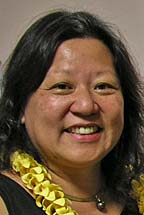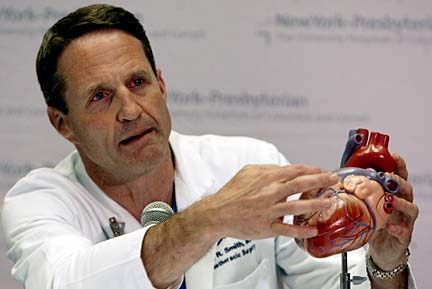— ADVERTISEMENT —

Women urged to focus
on their heart health
Experts say both genders must
be aware of disease's dangers
Kapahulu resident Cindy Lee was reminded of her quadruple bypass surgery when she heard former President Bill Clinton recently had the same operation.

|
In September's Women's Health Month, Honolulu cardiologist Dr. Joana Magno stressed how important it is for women to undergo a heart screening.
Heart disease is the No. 1 killer of women, said Magno, of Queen's Medical Center. "It's important for women to understand that they are much at risk of heart disease as the men are."
More women than men have died of cardiovascular disease in the last two decades, she said. Physical inactivity, cigarette smoking and obesity are risk factors that people can change to prevent heart disease.
Magno, a longtime volunteer of the American Heart Association, continues to educate residents and health care professionals of the high risk of heart disease among women.
Conventionally, if a man goes into the emergency room complaining of chest pains, cardiac tests are done, she said. If a woman has similar problems, she might experience a delay in diagnosis and treatment.
"We want to change those differences," said Magno. "Doctors are still learning."
She also noted that the misperception that most women die from breast cancer than heart disease still exists.
"In the three minutes that it takes to diagnose women of breast cancer, three women die of heart disease," she said. "The ratio is 1-to-10. Ten women die of heart disease for
every woman that dies of breast cancer."
Magno added that women in every adult age group are at risk. "I see women with coronary disease in their late 20s," she said.
Those of Hawaiian, Japanese, Filipino and Micronesian descent are at a higher risk of heart disease. Individuals who have diabetes are also at high risk.
The risk for diabetics to suffer from a heart attack is the same or higher than the risk for individuals who suffered a previous heart attack, said Magno.
In July 2003, Lee had finished her shift at Queen's, where she works as a nurse, and went home when she started to suffer from chest pains.
"It felt like someone was sitting on my chest," she said.
Lee was taken to Queen's by ambulance where, Magno said, she needed to undergo an operation to bypass her clogged arteries.
It was not the first time she had a heart problem.
Lee was 41 years old when she suffered a heart attack in Waikiki. She recalled feeling pain in her left shoulder while she was bodyboarding.

|
"I felt like I pulled my left shoulder," she said. "The water was rough that day."
Lee took a break on the beach when she later felt nauseous and dizzy. She was taken to Queen's, where she was told she suffered a heart attack.
At that time, Lee had quit smoking a year earlier, did not exercise and ate whatever she wanted.
Lee made an effort to walk daily and ate more fruits and vegetables and fewer fried foods after her heart attack. But she slid back to her old habits when she enrolled in the four-year nursing program at Hawaii Pacific University. There was no time to exercise, she said.
Lee also had a family history of cardiovascular disease. Her 75-year-old mother underwent triple bypass surgery in 1995. Both her mother and father as well as her two brothers suffer from hypertension.
Nowadays, Lee regularly exercises at 24 Hour Fitness and eats healthy foods. She also takes medication to prevent blood clots and keep her cholesterol and blood pressure low.
"Now it's like I have no excuse. I have to be really careful," she said.
The Queen's Medical Center offers free heart screening for men and women age 18 or older. Call 547-GIFT to make an appointment.
Kapiolani Women's Center and Straub Heart Center also have a program that helps women detect heart disease. Cost for a heart screening is $65; that includes EKG screening, cholesterol screening, blood glucose test, body fat analysis, blood pressure and a comprehensive women heart risk report. Call 535-7000 to register.
"There's definitely more awareness that's needed among women," said Karen Lemieux, executive director of the Straub Heart Center. "We're hoping with the programs that we offer, women will learn to be assertive with their doctors and also be educated on the signs and symptoms."
— ADVERTISEMENTS —
— ADVERTISEMENTS —